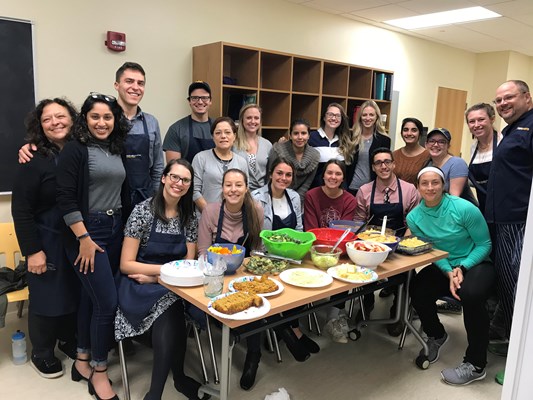Program Overview
The goal of the Culinary and Lifestyle Medicine Track program is to increase the number of physicians who have an understanding, appreciation and skill development in nutrition, food science and preparation and lifestyle management issues to be able to educate patients in those personal behaviors that would lessen the risk of chronic diseases. The Culinary and Lifestyle Medicine Track is an interdisciplinary program with faculty and students from the School of Medicine and the Davis College of Agriculture, Natural Resources Division of Animal and Nutritional Sciences.
Looking at the top causes of death in the United States according to the CDC, most of those causes can be mitigated by adherence to better lifestyle choices in food, exercise, stress reduction and restorative sleep. These conditions can be prevented, improved or even reversed by proper lifestyle management.
Regardless of which medical specialty the medical student decides to pursue, by studying and learning information in lifestyle management, they can hopefully lessen the impact of these chronic diseases as a practicing resident and physician in the future.
What can CLMT do for students?
Completion of this curriculum will give medical students:
- An enhanced level of training in culinary and lifestyle medicine concepts. Many courses that students take while in medical school focus on disease states and their treatments. Moving forward, it is our hope that many chronic disease states can be prevented or reversed with proper lifestyle modifications. No matter the specialty that students may choose, we know that information learned in this curriculum will assist future physicians in caring for their patients.
- An opportunity to participate in interdisciplinary learning communities and see the interconnection of various healthcare professionals as participants in wellness.
- A chance to enjoy meeting with leaders from prospective future communities and participate in community research opportunities
What can CLMT do for West Virginia?
We are dedicated to training students who will help West Virginians lead healthier lives. Much of West Virginia's population deal with chronic diseases that could be mitigated by healthy dietary habits, sleep, physical activity and mental wellness. By creating working relationships with healthcare professionals who value healthy habits, medical students and physicians will be able to assist West Virginians in improving their health in all aspects of their lives.
Program Aims
- Enable medical students to gain comfort in "prescribing wellness"
- Create physicians who recognize the value of self-care
- Offer students the opportunity to participate in community research and engagement
Our Team
Core Faculty & Staff
The Culinary and Lifestyle Medicine Track has core faculty and staff who provide direct oversight for the program, including such tasks as the creation and management of curricular content, precepting clinical rotations and monitoring student progress.
- Rosie Lorenzetti, M.D., MPH
- Co-director and co-founder of CLMT
- Certified Culinary Medicine Specialist (CCMS) and certified in Obesity Medicine (DABOM)
- Family physician at the WVU Center for Diabetes and Metabolic Health in Martinsburg
- Kathryn McQueen, M.D.
- Co-director of CLMT
- Family physician at the WVU Center for Diabetes and Metabolic Health in Martinsburg
- Melody Phillips, M.D.
- Lead CLMT faculty on the Morgantown Campus
- Certified Culinary Medicine Specialist
- Board-certified in Lifestyle Medicine
- Michelle Alder
- Program manager of the Culinary and Lifestyle Medicine Track – keeps us all on track!
Supporting Faculty & Staff
There are multiple supporting faculty members from several disciplines who are partners in the education of students enrolled in the track on all campuses.
Eastern Campus
- Madison Humerick, M.D.
- Co-founder of CLMT
- Creator of the Lifestyle Solution Course for the fourth-year M.D. curriculum
- Certified Culinary Medicine Specialist
- Family physician with an outreach street medicine program available to fourth-year medical students as an elective
- Jonathan Deiches, Ph.D.
- Psychologist with a special interest in disordered eating patterns
- Raja Mogallapu, M.D.
- Psychiatrist board-certified in Obesity Medicine
- Studies the link between obesity and depression
In addition to these faculty members, CLMT is also supported by a multidisciplinary team of endocrinologists and bariatric surgeons at the Eastern Campus.
- Endocrinology
- Bariatric Surgery
Morgantown Campus
- Laura Davisson, M.D.
- Internist board-certified in obesity medicine
- Works with students on elective rotations and nutritional projects through the bariatric clinic
- David Donley, M.S.
- Exercise physiologist who partners with CLMT for physical activity education modules
- Annette ‘Nettie’ Freshour, M.S.
- Director of the Dietetics Internship Program at WVU
- Collaborates with dietician graduate students and CLMT students in teaching kitchens
Charleston Campus
- Youmna Mousattat, M.D.
- Pediatrician focused on improving the lifestyles of children and families
- Nathan ‘Andy’ Vaughan, M.D., MBA
- CCMS-certified cardiologist
- Special interest in culinary medicine and heart disease prevention
Additional Supporting Faculty
- Samantha Minc, M.D., FACS
- Vascular surgeon with an interest in nutrition therapy for peripheral vascular diseases
- Former WVU School of Medicine faculty now offering a two-week CLMT rotation for fourth-year students interested in vascular surgery on the campus of Duke University
Overall, the Culinary and Lifestyle Medicine Track has a dedicated and multi-disciplined support faculty, welcoming new members who prioritize health promotion and lifestyle intervention in their work.